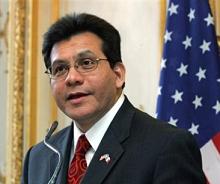Prosecutors assail Gonzales during meeting
 At a meeting in Denver, attended by about a dozen mainly Western prosecutors, Mr. Gonzales was told that the dismissals had cast a cloud over all the United States attorneys’ offices, not only over the prosecutors who were removed. But at that meeting, according to one official briefed on the discussion, prosecutors focused on steps to improve communications between the attorney general and United States attorneys.
At a meeting in Denver, attended by about a dozen mainly Western prosecutors, Mr. Gonzales was told that the dismissals had cast a cloud over all the United States attorneys’ offices, not only over the prosecutors who were removed. But at that meeting, according to one official briefed on the discussion, prosecutors focused on steps to improve communications between the attorney general and United States attorneys.
The criticism from prosecutors in the Justice Department’s field offices comes as the uproar over the dismissals appears to also have eroded confidence in Mr. Gonzales at the agency’s headquarters, where top officials have been focused for weeks on little else.
Mr. Gonzales and Mr. McNulty, who are expected to testify before Congress in two weeks, are said by officials to have maintained a working relationship, but their staffs have feuded over who is to blame.
Some of Mr. Gonzales’ aides have blamed Mr. McNulty for inflaming the issue by testifying on Feb. 6 that one of the ousted prosecutors, H. E. Cummins III, was removed for no reason. Mr. McNulty’s aides have blamed Mr. Sampson and Monica Goodling, the liaison to the White House, for failing to disclose their conversations with the White House before the removals.
In Washington, one Republican lawmaker said he was less concerned with Mr. Gonzales’s personal situation than how it was affecting the day-to-day performance of the Justice Department.
“I can’t imagine a department being more demoralized with what’s going on there,” said Senator Arlen Specter of Pennsylvania, the ranking Republican on the Judiciary Committee. Mr. Specter said in an interview that Mr. Gonzales needed to demonstrate his candor about the dismissals and assure people about his competence to retain his post.
“The Justice Department is too important to the country to have it hanging on the edge of a cliff,” he said.
A senior Justice Department official said Wednesday that the uncertainty over Mr. Gonzales’s future and the accusations from Congress were having a dispiriting effect.
“It’s a very difficult time,” said the official, who spoke on condition of anonymity. Policy and personnel decisions were being put off because of the uncertainty, the official said, adding, “It’s not a time to get into a battle with someone.”
Another official said that relatively few officials had been directly affected by the dismissal issue and that the agency’s work had continued without interruption.
Beleaguered presidents often seek refuge in foreign travel where they can be seen on a different stage. Mr. Gonzales has been engaged in his own version of that practice in recent days, setting off around the nation to deliver speeches about the department’s efforts to curb child pornography, meet with prosecutors and appear before friendly audiences.
On Wednesday, he seemed buoyed by a warm reception in his home state from about 1,000 people at the annual luncheon of the Houston Hispanic Chamber of Commerce.
As his staff kept the news media at a distance, Mr. Gonzales was greeted with cheers and applause.
“Because of all the great needs that exist in our community, I have to remain focused on doing my job,” he said. “Doing my job is serving the American public.”
He said he had received hundreds of messages from people who said they were praying for him, adding, “I can’t tell you how much that has meant to me and my family.”
The audience rewarded him with warm laughter when he said: “For many of us, getting where we are today was going down a bumpy road. I’m traveling down a bumpy road these days.”
(Published by The New York Times, March 29, 2007)